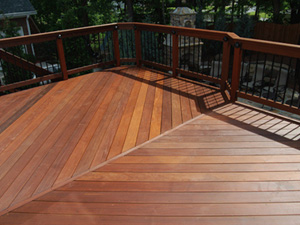More reminiscing…
Common trade names: Brazilian Teak, Tonka, Southern Chestnut
Genus: Dipteryx odorata
Janka Hardness (pounds-force): 3540
Description: Cumaru lumber is produced from the same plant that yields Tonka Beans, a vanilla substitute, perfume, and tobacco products. The FDA recommends today one not eat the product. Heartwood ranges from medium to dark brown, and various hues of red and purple. Cumaru tends to lighten with U/V exposure.
Location: Native to the Orinoco region of Northern South America
Common Aliases: Brazilian Teak, Tonka Bean.
Performance: It’s oily, it’s hard to glue, and the grain should be pretty well aligned to have success with fine woodworking using Cumaru. A milled product should be fine for your exterior applications, but please remember this wood is very nearly as dense as Ipe, and Cumaru dulls blades and breaks bits at the same rate as Ipe.
Acclimation: Cumaru for an outdoor application should be kept on site, stacked and covered for 10-21 days prior to installation. Generally speaking, the wood will acclimate properly on the low end of this scale, but local climactic variations require a longer window.
Common Uses: Virtually any project requiring a resilient and durable outdoor project. From decks to docks, to railroad ties or pilings, Cumaru can perform as well as almost any other organic product. Furnishings, floors, turnings, and cabinetry are other common uses for interior applications.
From: The Wood Database
Cumaru (Dipteryx odorata)
Common Name(s): Cumaru, Brazilian Teak, Tonka Bean
Scientific Name: Dipteryx odorata
Distribution: Northern South America
Tree Size: 130-160 ft (40-50 m) tall, 3-5 ft (1-1.5 m) trunk diameter
Average Dried Weight: 68 lbs/ft3 (1,095 kg/m3)
Basic Specific Gravity: .86
Hardness: 3,540 lbf (15,750 N)
Rupture Strength: 24,840 lbf/in2 (171,280 kPa)
Elastic Strength: 3,020,000 lbf/in2 (20,830 MPa)
Crushing Strength: 13,460 lbf/in2 (92.8 MPa)
Shrinkage: Radial: 5.0%, Tangential: 7.6%, Volumetric: 12.0%, T/R Ratio: 1.5
